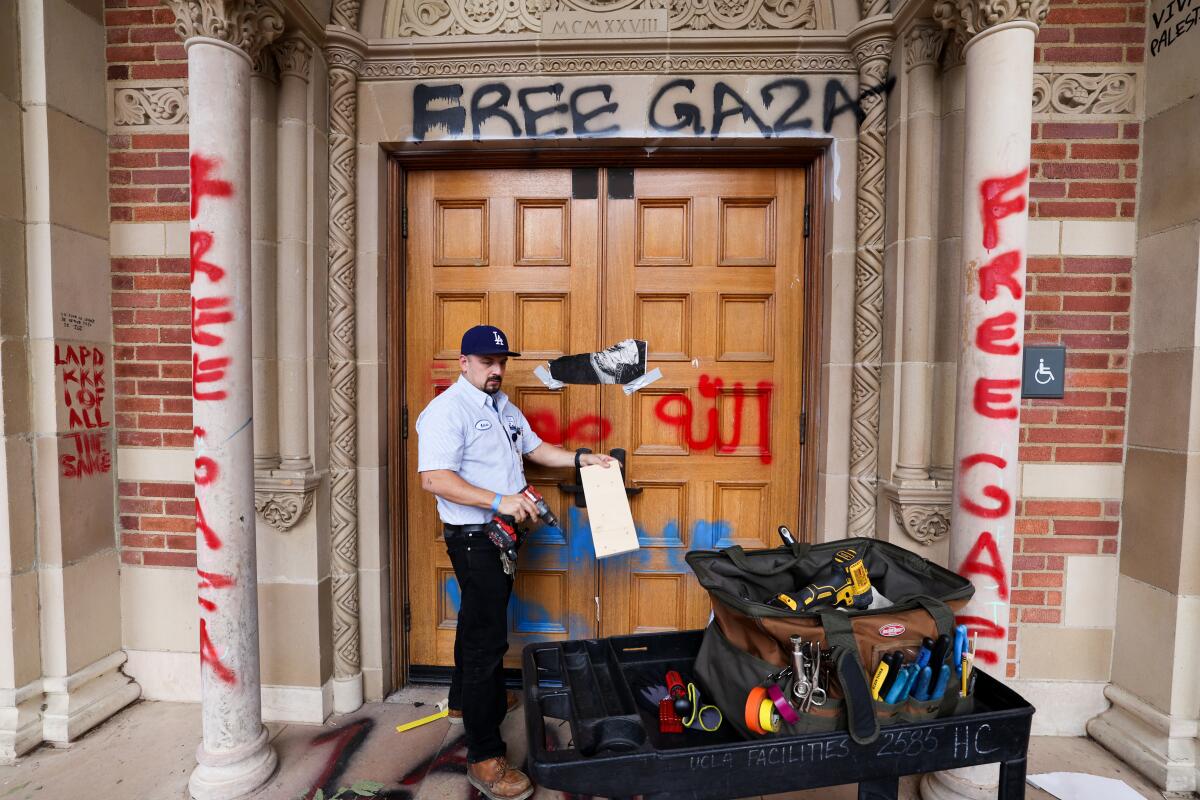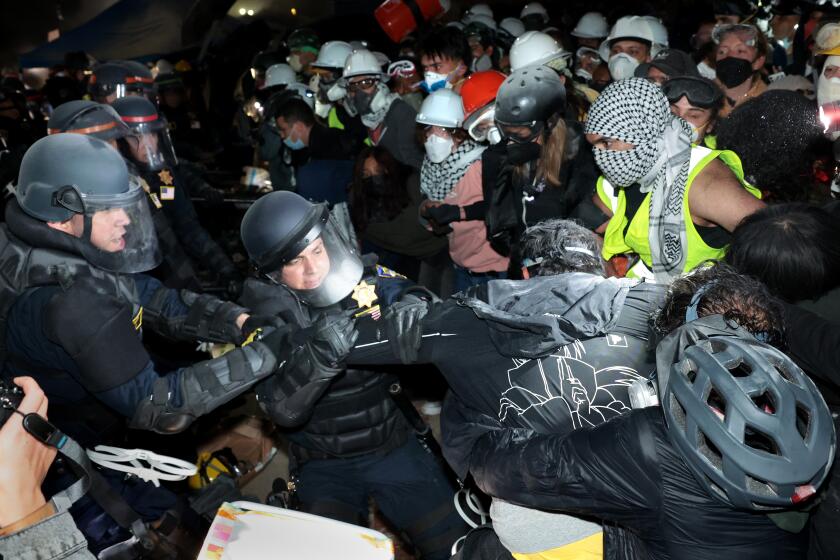Congress investigating UCLA over treatment of Jewish students amid pro-Palestinian protests

A congressional education committee has chastised UCLA for its response to a pro-Palestinian encampment and the violent instigators who attacked it, calling on the university to turn over documents regarding an “inadequate response to antisemitism and failure to protect Jewish students.”
UCLA Chancellor Gene Block and his counterparts from Northwestern and Rutgers are scheduled to testify at a May 23 hearing titled “Calling for Accountability: Stopping Antisemitic College Chaos.” The presidents of Yale and Michigan — who previously were slated to testify — will now be called to appear for transcribed interviews.
For the record:
2:43 p.m. May 18, 2024An earlier version of this article said the pro-Palestinian encampment at UCLA was set up for two weeks. It was on campus for one week before police dismantled it.
Following violence and growing unrest at campuses nationwide, House Republicans have begun using their oversight powers to pressure colleges to protect Jewish students and crack down on pro-Palestinian demonstrations. The latest move underscores how House Republicans are attempting to use the campus unrest as a major issue during the election year.
Rep. Virginia Foxx (R-N.C.), chair of the House Committee on Education and the Workforce, in a letter Wednesday directed Block, UC President Michael V. Drake and Rich Leib, chair of the UC Board of Regents, to produce all documents, communications and security videos related to alleged antisemitic incidents at UCLA since the start of the Israel-Hamas war on Oct. 7.
The conservative congresswoman is also seeking texts and other communications from staff, police and the regents, giving May 21 as the deadline for delivery.
The committee investigation is focusing on the activities and handling of a pro-Palestinian encampment that sat outside Royce Hall for a week until police dismantled and arrested more than 200 people.
UCLA must turn over “all video/audio recordings since April 24, 2024, including security/surveillance recordings and police body camera recordings, of the UCLA encampment, and related activities,” Foxx wrote in the letter.
Mary Osako, vice chancellor of strategic communications for UCLA, said in a statement: “We have received the committee’s letter and are reviewing it. Chancellor Block looks forward to testifying in front of the committee next week and cooperating with their requests.”
Hours of violence that unfolded overnight at a pro-Palestinian encampment set up on UCLA’s campus prompted administrators to cancel classes on Wednesday and has triggered questions about authorities’ response.
The inquiry is focusing on the pro-Palestinian encampment and UCLA’s decision to allow it as well as a series of incidents Foxx characterized as antisemitic. She also criticized UCLA’s decision not to have police ready to intervene on April 30 when pro-Israel counterprotesters violently attacked the camp.
More than a week after the assault by outside aggressors, no one has been arrested. Multiple law enforcement agencies are investigating why it took so long to quell the violence, using facial recognition technology, cellphone data and other tools to try to identify the perpetrators.
“UCLA’s leaders have allowed their campus to become a severe and pervasive hostile environment for Jewish students, standing by as students, faculty and affiliates were assaulted and harassed,” Foxx wrote. “For days, the unlawful encampment’s checkpoints illegally denied students access to campus buildings.”
The letter alleges that “Jewish students were attacked, harassed and intimidated for walking on their own campus” and students were “denied a safe and uninterrupted learning environment.”
Among the incidents cited was one on April 28 in which pro-Palestinian protesters are accused of kicking a Jewish woman in the head.
An Instagram post of the scene, posted two days later, became a flash point, inflaming tensions at UCLA. The woman who was kicked, who did not wish to be identified, told The Times she had been shoved to the ground by another demonstrator while attempting to retrieve her fallen Israeli flag during a pro-Israel rally near a group organized in support of Palestinians in Gaza.
In the wake of a mob attack on a pro-Palestinian encampment, UCLA chancellor is facing faculty criticism, including a no-confidence vote to take place Thursday.
Foxx also documented what she characterized as an antisemitic trope in which an image of Block was “displayed at the encampment [and] featured him with horns and red eyes.”
In her letter, Foxx said that set the stage for UCLA’s campus to erupt into violence when a group of instigators tried to dismantle the pro-Palestinian encampment by force. Furthermore, she pointed out, the university’s police force didn’t formally request help from outside agencies, including the Los Angeles Police Department, until midnight and it took nearly three hours for law enforcement to arrive and restore order.
Foxx quotes Wade Stern, president of the Federated University Police Officers’ Assn., saying the UCLA administration “owns all the fallout from the response and lack of response to this protest.”
She went on to add: “While UCLA authorized the clearing of the encampment the next day, resulting in over 200 arrests, this action came far too late.”
The committee also wants to see disciplinary records for faculty and students “relating to alleged antisemitic incidents” at the university since Oct. 7. Foxx noted a 2015 study in which “a third of all Jewish students at UCLA reported being blamed for the actions of the Israeli government because of their Jewish identity either frequently or occasionally.”
More to Read
Sign up for Essential California
The most important California stories and recommendations in your inbox every morning.
You may occasionally receive promotional content from the Los Angeles Times.













